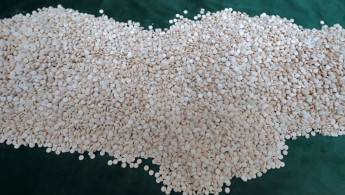Syrian regime seizes hummus bowls made out of drug captagon
The Syrian regime announced on Tuesday they had seized 24 kilogrammes of captagon that had been crushed and reconstituted to look like hummus bowls.
The amphetamine is produced in pill form but these smugglers had crushed it and used the resulting paste to "mould pottery-like dishes coated with a brown adhesive," the interior ministry said.
One man was arrested in Damascus in connection with the thwarted trafficking attempt, the statement said, without specifying where the shipment of fake hummus bowls was bound for.
Captagon traffickers have in recent years found ever more imaginative places in which to conceal their drug, from fake oranges, to real hollowed-out pomegranates and pitted olives.
They have purposely manufactured various ornamental objects or construction equipment with cavities holding pills that can only be retrieved at the other end by smashing their handiwork.
By manufacturing objects with the amphetamine powder itself, the traffickers are taking a leaf out of the Latin American drug cartels' book.
This video from Syria's interior ministry is wild.
— Aya Iskandarani (@Aya_Isk) September 6, 2022
They said a drug trafficker made hummus bowls out of Captagon to transport the drug (they didn't specify where to).
Captagon pills are produced mainly in Syria and smuggled to large consumer markets in the Gulf. pic.twitter.com/JOminXQB4c
Cocaine in its harder-to-detect liquid form in particular can be used to soak anything from plywood to T-shirts and retrieved once it reaches its destination.
Most of global captagon production originates in Syria, spurring a multi-billion-dollar industry that has made the drug the country's largest export by far.
Saudi Arabia is the largest market for captagon, a versatile drug popular among the partying elite but also used for weight loss and by students working several jobs.
According to an AFP tally, around 250 million captagon pills were seized worldwide in the first eight months of 2022.





 Follow the Middle East's top stories in English at The New Arab on Google News
Follow the Middle East's top stories in English at The New Arab on Google News


